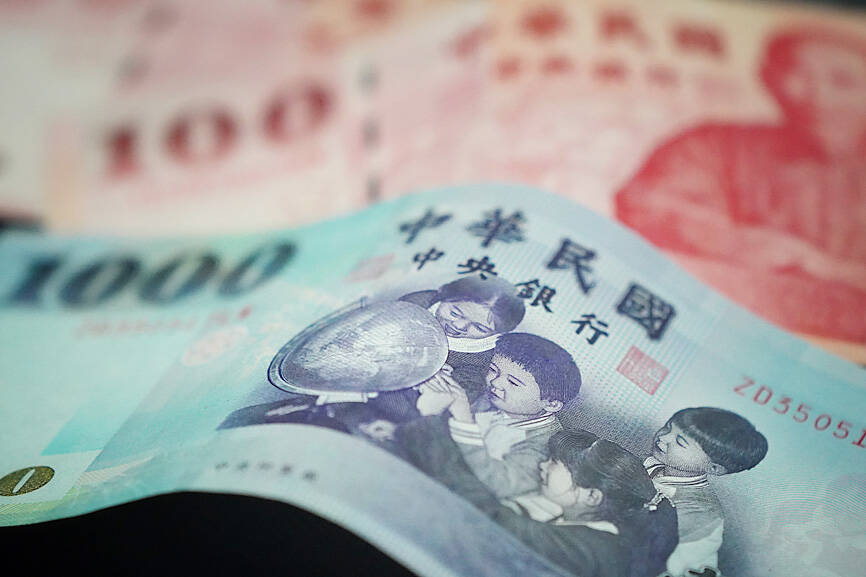The central bank yesterday said it has stabilization mechanisms on standby that would infuse the market with sufficient liquidity, and that it is confident that it can cope with fluctuations in the foreign exchange market and keep the New Taiwan dollar stable.
“Since major international events such as the Asian financial crisis in 1997, the global financial crisis from 2008 to 2012, the European debt crisis [from 2009 to 2010] and the COVID-19 pandemic in 2020, the bank has stabilized the market through flexible and effective monetary policies and foreign exchange management measures, allowing Taiwan to safely weather market turmoil,” the central bank said in a statement. “Taiwan has enjoyed trade surpluses for long, with a sound international balance of payments and extremely low external debt.”
“The exchange rate of the New Taiwan dollar has been dynamically stable for a long time, and its volatility is smaller than that of major currencies, such as the euro, won, yen, Singaporean dollar and Australian dollar,” the central bank said.

Photo: CNA
The central bank’s statement came as the TAIEX plummeted 9.7 percent yesterday, the index’s heaviest loss on record, although the currency managed to edge up NT$0.033, or 0.1 percent, against the US dollar at the close in Taipei trading.
Global markets have been impacted by US President Donald Trump’s reciprocal tariffs since last week. The US dollar index, which gauges the currency against six major peers, dropped 1.39 percent from Wednesday last week to yesterday, while major currencies had a mixed performance against the greenback over the period, the central bank said.
The yen, the euro, New Taiwan dollar and Canadian dollar appreciated by 2.7 percent, 1.59 percent, 0.1 percent and 0.04 percent respectively against the US dollar during the period, while the Australian dollar, pound, yuan and won depreciated by 4.52 percent, 0.75 percent, 0.29 percent and 0.13 percent respectively, the bank’s data showed.
There were no “panicked” outflows in the foreign exchange market yesterday, Department of Foreign Exchange Director-General Eugene Tsai (蔡炯民) told a news conference in Taipei, after the central bank released the nation’s foreign exchange reserve data for last month, which showed that the reserves increased by US$438 million from the previous month to US$578.022 billion.
That marked the second-highest level for Taiwan’s foreign exchange reserves on record, despite intervention by the central bank last month to curb the fall in the currency.
The central bank said it had intervened in the local foreign exchange market to keep the New Taiwan dollar’s fluctuations within a manageable range.
Last month, the local currency depreciated NT$0.362, or 1.09 percent, against the US dollar, the bank’s data showed.
Even so, returns from the bank’s management of reserve assets and changes in the exchange rates of other reserve currencies against the US dollar still contributed to the increase in the foreign exchange reserves, it said.
Due to geopolitical concerns and worries about Trump’s tariff policy, foreign investors have sold a large amount of Taiwanese stocks and remitted them, contributing to declines in the New Taiwan dollar and Taiwanese equities.
At the end of last month, the market value of securities investments and deposits held by foreign portfolio investors reached US$708.9 billion, which is equivalent to 123 percent of foreign exchange reserves, compared with US$821.3 billion, or 142 percent of foreign exchange reserves, the previous month, the central bank said.

Taiwan’s rapidly aging population is fueling a sharp increase in homes occupied solely by elderly people, a trend that is reshaping the nation’s housing market and social fabric, real-estate brokers said yesterday. About 850,000 residences were occupied by elderly people in the first quarter, including 655,000 that housed only one resident, the Ministry of the Interior said. The figures have nearly doubled from a decade earlier, Great Home Realty Co (大家房屋) said, as people aged 65 and older now make up 20.8 percent of the population. “The so-called silver tsunami represents more than just a demographic shift — it could fundamentally redefine the

The US government on Wednesday sanctioned more than two dozen companies in China, Turkey and the United Arab Emirates, including offshoots of a US chip firm, accusing the businesses of providing illicit support to Iran’s military or proxies. The US Department of Commerce included two subsidiaries of US-based chip distributor Arrow Electronics Inc (艾睿電子) on its so-called entity list published on the federal register for facilitating purchases by Iran’s proxies of US tech. Arrow spokesman John Hourigan said that the subsidiaries have been operating in full compliance with US export control regulations and his company is discussing with the US Bureau of

Businesses across the global semiconductor supply chain are bracing themselves for disruptions from an escalating trade war, after China imposed curbs on rare earth mineral exports and the US responded with additional tariffs and restrictions on software sales to the Asian nation. China’s restrictions, the most targeted move yet to limit supplies of rare earth materials, represent the first major attempt by Beijing to exercise long-arm jurisdiction over foreign companies to target the semiconductor industry, threatening to stall the chips powering the artificial intelligence (AI) boom. They prompted US President Donald Trump on Friday to announce that he would impose an additional

Pegatron Corp (和碩), a key assembler of Apple Inc’s iPhones, on Thursday reported a 12.3 percent year-on-year decline in revenue for last quarter to NT$257.86 billion (US$8.44 billion), but it expects revenue to improve in the second half on traditional holiday demand. The fourth quarter is usually the peak season for its communications products, a company official said on condition of anonymity. As Apple released its new iPhone 17 series early last month, sales in the communications segment rose sequentially last month, the official said. Shipments to Apple have been stable and in line with earlier expectations, they said. Pegatron shipped 2.4 million notebook